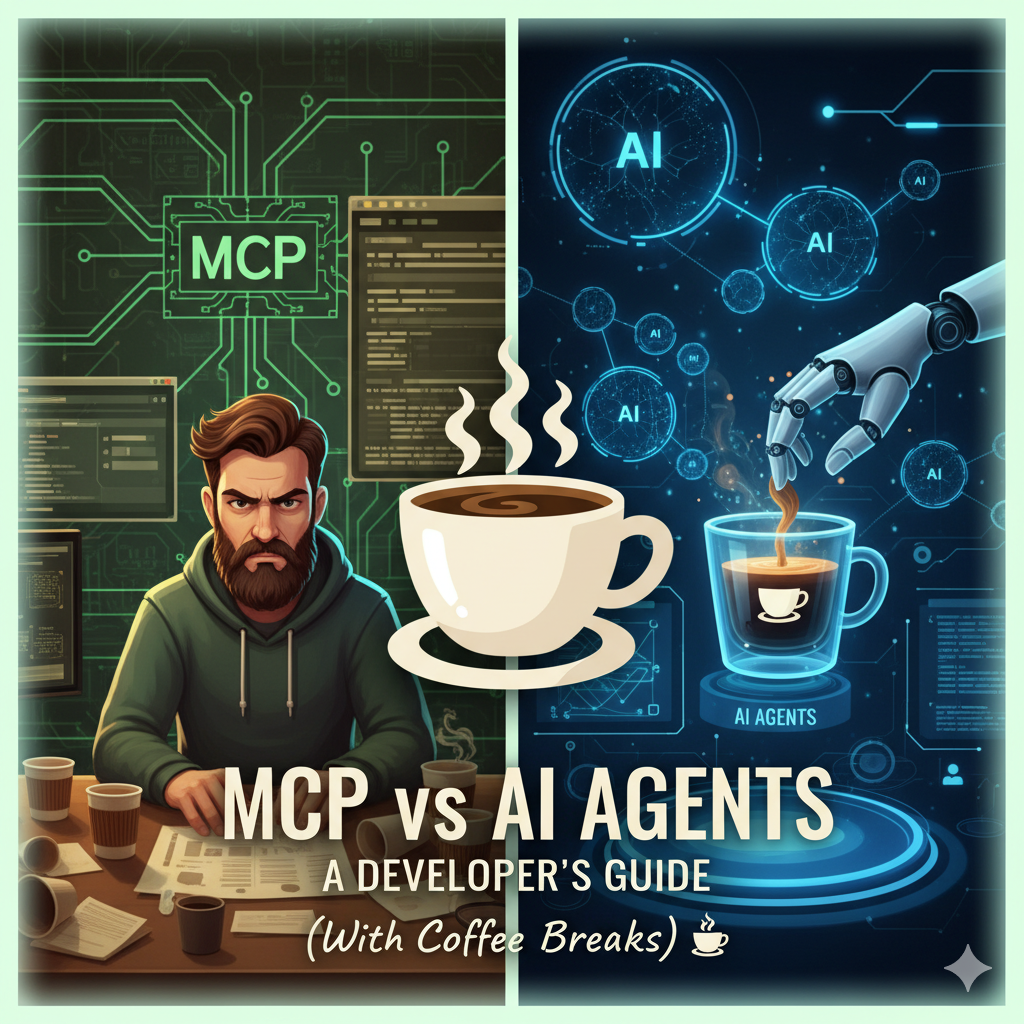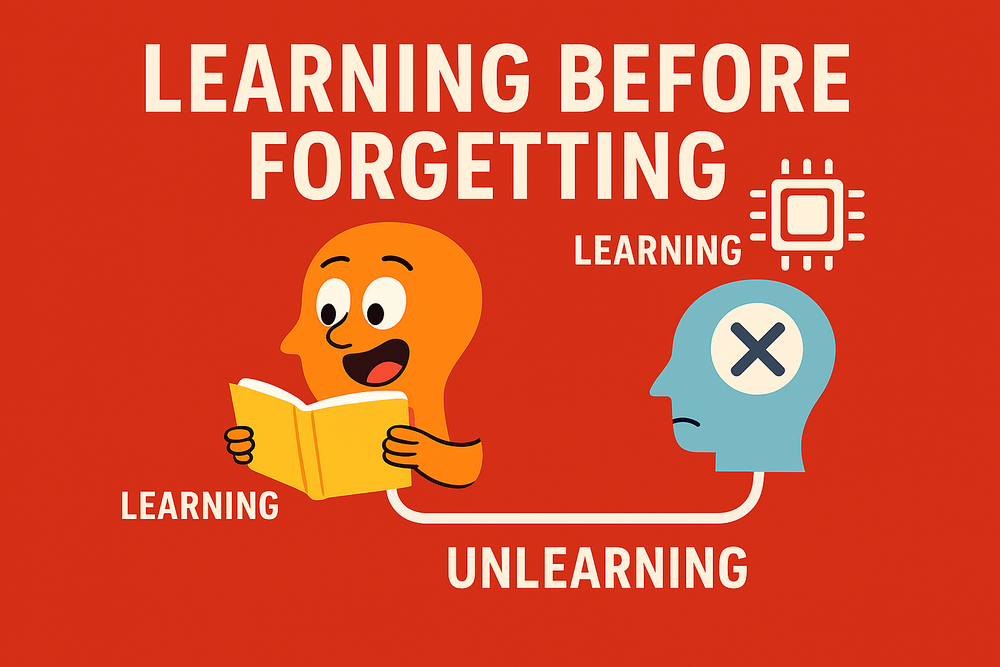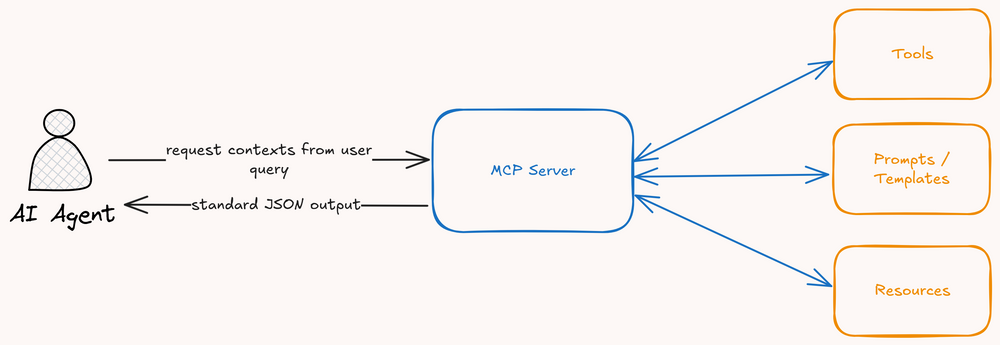Introduction (Grab Your Coffee First)
Hey fellow developer! Before we dive into this, go grab your coffee ☕. I'll wait.
...
Got it? Perfect. Because we're about to explore two buzzwords that are currently taking over our Slack channels and making our product managers way too excited: Model Context Protocol (MCP) and AI Agents.
Now, I know what you're thinking: "Another blog about AI concepts." But please stay with me here. Understanding the difference between these two is like understanding the difference between your coffee beans and your coffee maker. Both are essential, but they serve very different purposes (and mixing them up would be... problematic).
So, What Exactly is MCP?
Model Context Protocol is Anthropic's answer to the question: "How do we stop writing custom integrations for every single data source we want our AI to access?"
Think of MCP as the USB-C of AI data connections (but hopefully less chaotic than the 47 different implementations of USB-C we currently have to deal with).
MCP in Plain English:
- It's a standardized protocol - like REST, but specifically for AI models to talk to data sources
- It's client-server architecture - your AI app is the client, your data sources run MCP servers
- It's secure - comes with proper authentication and permissions (unlike that API you wrote at 3 AM during a crunch)
- It's extensible - add new data sources without refactoring your entire codebase
Real Example:
Remember that time you spent three sprints integrating Notion, then Google Drive, then Confluence, and each one was slightly different and required its own special handling? MCP is designed to make that nightmare obsolete.
Instead of:
if (source === 'notion') { /* 200 lines of code */ }
else if (source === 'gdrive') { /* 250 lines of different code */ }
else if (source === 'confluence') { /* why is this 300 lines? */ }You get:
// Connect to any MCP server the same way
const data = await mcpClient.query(source);Takes sip of coffee
Beautiful, isn't it?
What About AI Agents?
An AI Agent is basically that intern you wish you had - one that actually knows what they're doing, doesn't need coffee breaks (okay, this analogy is falling apart), and can work 24/7 without complaining.
AI Agents in Plain English:
- They're autonomous - give them a goal and they figure out how to achieve it
- They plan - they break down complex tasks into steps (better than your PM does)
- They use tools - they can call APIs, run code, search the web, etc.
- They iterate - if something doesn't work, they try a different approach
Real Example:
You: "Hey Agent, research our competitors' pricing and create a comparison table."
Agent proceeds to:
- Search for competitor websites
- Extract pricing information
- Analyze different tiers
- Create a formatted comparison table
- Even add some insights you didn't ask for (the overachiever)
All while you're on your coffee break. ☕
The Showdown: MCP vs AI Agents
Let me break this down with a comparison table, because we're developers and we love tables:
| Aspect | MCP | AI Agent |
|---|---|---|
| What it does | Provides standardized data access |
Executes complex tasks autonomously |
| Your coffee analogy |
The plumbing that delivers water |
The barista making your latte |
| Level of autonomy |
Zero (it just responds to requests) |
High (it decides what to do) |
| Decision making |
None | Constantly |
| Your role | Define data schemas and access |
Set goals and guardrails |
| When it breaks | Connection issues, auth problems |
Existential crisis about task interpretation |
The Plot Twist
Here's the thing that'll blow your mind after that third espresso: MCP and AI Agents aren't competitors. They're teammates. They're peanut butter and jelly. They're... okay, I need more coffee analogies.
AI Agents can USE MCP to access data. It's like:
- MCP = Your coffee supply chain
- AI Agent = The person making strategic decisions about when and how to brew coffee
How They Work Together (The Dream Team)
Imagine building a "Weekly Report Generator Agent":
# Your AI Agent's internal monologue (probably)
"Okay, I need to create a weekly report. Let me think...
Step 1: Get completed tasks
- *Uses MCP to connect to Jira*
- Retrieved 47 tasks (nice!)
Step 2: Check code activity
- *Uses MCP to connect to GitHub*
- 127 commits this week (someone's been busy)
Step 3: Review meeting notes
- *Uses MCP to connect to Obsidian*
- Found 3 standup notes and 2 planning docs
Step 4: Generate insights
- *Analyzes all the data*
- Creates executive summary
- Adds some graphs (PMs love graphs)
Step 5: Save the report
- *Uses MCP to write back to Obsidian*
- Done! Time for a virtual coffee break."See? The Agent makes decisions and orchestrates everything, while MCP handles the dirty work of actually getting the data.
Pros and Cons (Because Balance)
| Feature | MCP | AI Agents |
|---|---|---|
| Pros | Write once, use everywhere | Automate complex workflows |
| Secure and controlled | Adaptive and flexible | |
| Easy to maintain | Can handle unexpected situations |
|
| Works with any AI model | Makes you look like a 10x engineer |
|
| Cons | Requires setting up servers for each data source |
Can go hilariously wrong |
| Not magic still needs proper implementation |
Debugging is interesting | |
| Your manager might not understand the setup time |
Computationally expensive |
|
| Requires careful prompt engineering |
When to Use What? (Decision Tree Time)
Use MCP when:
- You're tired of writing custom integrations for every data source
- Security and access control are critical
- You want to build infrastructure that'll last longer than your coffee maker
- Multiple AI applications need to access the same data
Code pattern: If you're writing switch statements for different data sources, you might benefit from MCP.
Use AI Agents when:
- You have multi-step workflows that are eating your time
- The task requires decision-making and adaptation
- You want to impress people at standup with your automation game
- You have enough compute budget (check with finance first)
Code pattern: If you're manually running the same 10 commands every morning, you might benefit from an AI Agent.
Use BOTH when:
- You're building something actually useful (not just a demo)
- You need the flexibility of agents + the reliability of MCP
- You want to future-proof your architecture
- You're ready to be the hero who automates the boring stuff
The Future (Crystal Ball Section)?
Refill coffee ☕
Here's where things get exciting:
Multi-Agent Systems with MCP
Imagine multiple specialized agents working together, all sharing data through MCP:
- Code Review Agent
- Documentation Agent
- Testing Agent
- Deployment Agent
All coordinated through a main orchestrator, all accessing data through standardized MCP connections. It's like a dev team that never argues about code style!
Self-Discovering Agents
Future agents might automatically discover available MCP servers and register themselves:
Agent: "Oh, there's a Slack MCP server available?
Cool, I'll use that to send updates."Agentic MCP Servers
MCP servers that aren't just dumb data pipes, but have some intelligence:
Developer: "Get recent customer complaints"
Smart MCP Server: *Analyzes, filters, categorizes, then returns*
"Here are the top 5 patterns I found in 847 complaints"Real Talk: Should You Care?
If you're a developer building AI-powered tools, yes. Absolutely. Here's why:
MCP saves you from the integration hell we've all been through. One standard to rule them all. One standard to bind them. (Okay, Lord of the Rings references might be a sign I need to cut back on the coffee.)
AI Agents are genuinely useful for automating workflows. Not everything needs an agent, but when you find the right use case, it's chef's kiss.
Together? They're the foundation for the next generation of developer tools. The ones that'll make your job easier, not replace you (because who else will debug the agents when they go rogue?).
Conclusion (Final Coffee Thoughts)
So
- MCP is your infrastructure layer - the pipes that connect AI to data
- AI Agents are your automation layer - the brains that decide what to do
- They work best together, like coffee and code reviews
MCP isn't flashy, but it's essential infrastructure (like that coffee machine in the break room). AI Agents are exciting and powerful (like that new espresso machine everyone's buzzing about).
Build your systems with MCP for solid data access. Add AI Agents for intelligent automation. Your future self (and your team) will thank you.
Now, if you'll excuse me, I need to refill my coffee and build an AI Agent that uses MCP to remind me when my coffee's getting cold.
P.S. If you're still confused about MCP vs AI Agents, think of it this way:
- MCP = Your IDE's ability to connect to different services
- AI Agent = GitHub Copilot on steroids with executive function





